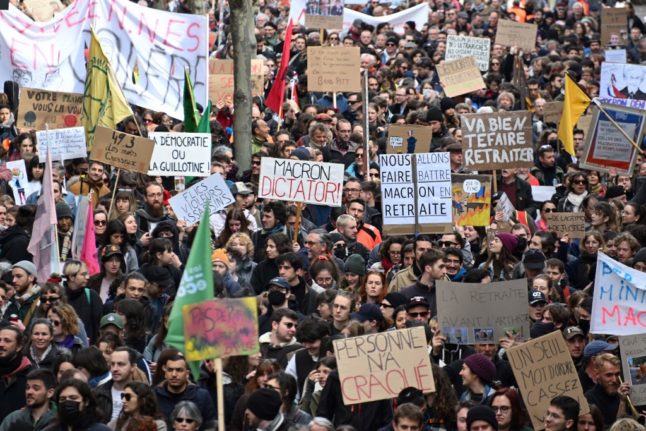Hundreds of thousands of people took to the streets once again on Tuesday to protest against pension reform in France, the latest stage in a long-running battle.
The protest comes just one week after French Prime Minister Elisabeth Borne and her government survived two votes of no-confidence in parliament – one falling short by just nine votes – after using constitutional powers to push through the reform without allowing MPs a vote.
For many French people across the country, the decision to use the controversial legislative tool Article 49.3 has been a catalyst to continue taking to the streets and expressing their disagreement with the reform.
The Local went to the demo in Paris to talk to marchers about why they are still on the streets, when it seems that the reform has already passed.
Amid a sea of signs with slogans referring to president Emmanuel Macron as a “monarch” or “dictator”, many protesters felt particularly motivated to make their voices heard after the president’s recent TV interview defending the pension changes.
READ MORE: OPINION: Despite pension reform passing, Macron faces four years as a ‘blocked’ president
“Macron’s speech really showed that he is out of touch with reality – like the way he talked about people on minimum wages. It was just a stab in the back. I think with the ‘yellow vest’ movement we saw that people take to the streets out of necessity, not just for fun”, Camille, age 26, told The Local on Thursday at the start of the protest in Paris’ Place de la République.
“The anger French people feel is bigger than pension reform.
“For a lot of us young people, we feel like we have not been listened to. Macron must realise that he was elected by default, not because we voted for his mandate specifically”, she said.
She and her friend Pauline told The Local that this was their second pensions protest.
“We started coming out to protests last Thursday because we wanted to support the people who have been protesting this whole time. We saw that the government did not listen to them and we wanted to support them, even if we are showing up a bit late”, Camille explained.
“In the beginning it was not as easy to tell our companies that we are going out on strike, but now as time passes they are more understanding”.
Camille and Pauline were not the only young people present at Tuesdays protest, Morgane, aged 18 and still in high school, showed up in Paris as well, even though she lives well over an hour outside of the city.
“As young people we have to show the government how unhappy we are and get them to listen to us. We can block our high schools and show up to protest.
“I don’t think hope is lost. We are still here, on the streets. Now the goal is for the law to be pulled (…) but the other goal is just for Macron to listen to us. He thinks he can make decisions completely by himself and that is not how democracy is supposed to work (…) to use Article 49.3 is shameful for our democracy”.
For Stephanie and Steve (aged 47 and 46 respectively), two long-time protesters who met and began their romantic relationship amid the ‘Yellow Vest’ protest movement, Tuesday represented “at least our 270th protest together”, Steve estimated.
“The reason we continue to protest is because of what happened in 2006,” explained Steve. “At the time, there was a reform called the CPE and it was pushed through parliament, but eventually after pressure from people protesting in the streets it was pulled”.
President Jacques Chiraq’s, CPE reform would have overhauled employment law in France – after three months of widespread protest, it was repealed. Other protesters on Tuesday also referenced this moment in French history as inspiration for continued protests against pension reform.
Union representative for his company, Alexi, said that this shows “we can always go back”. Alexi told The Local that he believes people will continue to take to the streets in the coming weeks.
“It’s true that if [pension reform] passes through the constitutional council it could be more complicated to mobilise people, but the vast majority of French people support the strikes.
“In comparison to the fuel strikes in the autumn when people did not support refinery workers, now people support them blocking the refineries. If people see a road blocked, they don’t complain. They support us”, he said.
Steve echoed this sentiment. “This moment does feel similar to the ‘yellow vest’ protests. The mentality and spirit is similar (…) Article 49.3 was really the straw that broke the camel’s back. It was a psychological limit for people (…) People feel like if this pushes through, then Macron can just push through whatever he wants in terms of reforms that are unpopular with the public.
“That’s why people will continue to protest”.
“I think Macron’s attitude will continue to radicalise people”, Stephanie added.
Police violence has been an ongoing topic amid French pension protests in recent days – rights groups, as well as the Council of Europe, have commented on excessive use of force.
On Friday, the Council of Europe said that peaceful protesters and journalists had to be protected from police violence and arbitrary arrest. France’s Human Rights League also accused the authorities of “undermining the right of citizens to protest by making disproportionate and dangerous use of public force”.
Last Thursday saw the most violent clashes yet between protesters and security forces, as tensions erupted into pitched battles on the streets of Paris and police reported 457 arrests across France and injuries to 441 officers.
READ MORE: EXPLAINED: Why do French police love to use tear gas so much?
For high-school student, Morgane, this was another reason to continue taking to the streets. “We are a bit afraid of violence. But we cannot let things continue like this. If they put more police onto the streets to convince us not to protest, then we cannot let that stop us.
“We do take note of the police violence and it is shameful that we cannot even protest correctly and safely”, said the 18-year-old.
Camille, 24, who was at the protest with her mother, said: “There are many reasons for the anger that you see in France right now, but I think mostly it’s the feeling that the people have been mocked.
“The concept of democracy itself has been put into question. It’s more than just pensions.”



 Please whitelist us to continue reading.
Please whitelist us to continue reading.
Assuming three is a general understanding that the course of the existing pension system will lead to insolvency, could you outline what are the actual counter proposals to the government’s plan? Or perhaps, what proposals do the unions have? What alternative do they support ?